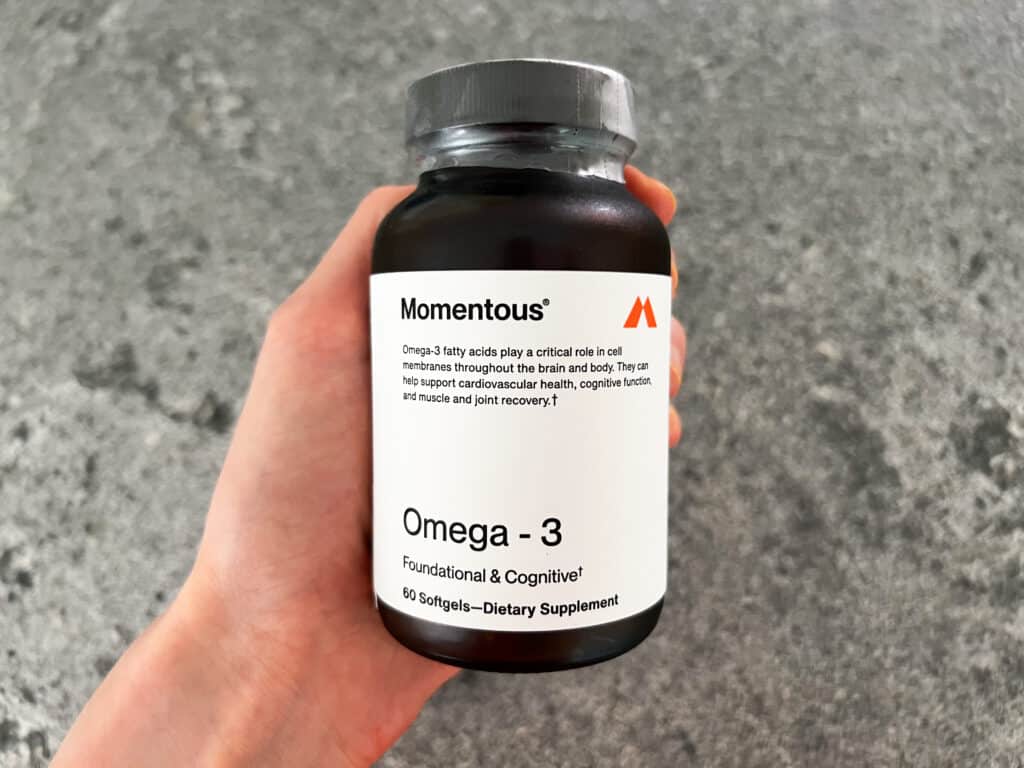What’s the deal with omega-3 fats?

We all hear the term “healthy fats”, but what does that actually mean? When it comes to healthy fats, omega-3 fats are the gold standard and extremely important for overall inflammation, specifically in the brain and heart. Since most of us aren’t eating fish every day, let alone twice a week, I hope this article […]
We all hear the term “healthy fats”, but what does that actually mean? When it comes to healthy fats, omega-3 fats are the gold standard and extremely important for overall inflammation, specifically in the brain and heart.
Since most of us aren’t eating fish every day, let alone twice a week, I hope this article helps you to consider taking an omega-3 supplement if you aren’t already. It’s one of the only two supplements I take daily!
What are omega-3 fats?
Omega-3 fats are polyunsaturated fats that play an important part in all of your cell membranes (they make up 25% of the cell membranes in your brain). They are essential for mood, brain health, heart health, hormone production, and inflammation.
There are three main types of omega-3 fatty acids:
- EPA and DHA: these are the omega-3’s found in fatty fish. EPA is associated with the most well known omega-3 benefits correlated with inflammation and DHA is best known for its effects on brain and eye health specifically, but they work synergistically with each other.
- ALA: this is the omega-3 fat you find in most plant based sources. ALA also has anti-inflammatory benefits, but DHA and EPA are a lot more important and well studied. When eating plant-based omega-3 sources, some of the ALA gets converted into EPA and DHA in the body, but this is a very small amount. That is why eating fatty fish (or supplementing) is the best way to get in the more essential omega-3 fats (EPA+DHA).
Why are omega-3 fats so good for you?
Omega-3 fats are complex and have so many roles and health benefits, but I’m just going to keep it simple and focus on the brain and heart.
An important thing to remember is that since omega-3 fats have strong anti-inflammatory and antioxidant properties, high levels of omega-3 fats can reduce your risk of inflammatory diseases (many diseases are associated with or caused by increased inflammation).
Heart health (1)
EPA and DHA (EPA more so) are strongly associated with improved heart health. The most researched being that they lower triglyceride levels, and high triglycerides are heavily linked to poor metabolic health and heart disease. Also, their strong anti-inflammatory properties can reduce your risk of plaque building up in your arteries (atherosclerosis). Lastly, they may slightly lower your blood pressure.
Brain health (2)
EPA and DHA are highly concentrated in the brain, so it’s no wonder it plays a role in mood, depression, and neurodegenerative diseases. They protect the brain from inflammation and, more importantly, help to increase blood flow to the brain, which is extremely important for brain health in the long and short term.
One very impressive study compared high dose EPA supplementation (1000mg) to depressant drugs (20mg fluoxetine) and found that they had equal effects in reducing depressive symptoms, getting the strongest effect when used in combination (3).
Omega-3 fats and diet: how much do you need?
There’s a reason the American Heart Association recommends that we all eat fatty fish twice a week. Our bodies can’t produce enough omega-3 fats, so we need to get them through diet or supplementation.
The foods highest in EPA and DHA are fatty fish. You can get omega-3 fats from plants, but mostly in the form of ALA, so you aren’t getting much of the more important EPA and DHA.
Foods high in omega-3 fats
- Fatty fish (EPA+DHA): mackerel, herring, salmon, sardines, anchovies, oysters
- Plant based (mostly ALA): chia seeds, flaxseed, hemp seeds, walnuts, soybeans, tofu, avocado
So, how much omega-3 fats should you be getting every day?
You want to get at least 1g of combined EPA and DHA daily. To put that into perspective, 4 ounces of salmon will give you anywhere from 1-3 grams of omega-3 fats, depending on the type. One 3-ounce serving of canned sardines has around 1.2g. The amount varies on the specific type of fish.
I don’t know about you, but I can’t eat fish every day. That’s why I supplement with an omega-3 fish oil supplement!
The best omega-3 supplement

There are so many fish oils out there and they vary a lot in quality. Since fish can be high in things like mercury and other contaminants, it’s important to know your source and ensure they are certified third party tested.
I think Momentous has the best omega-3 supplement. They’re super transparent with their sourcing and NSF certified to make sure there are no contaminants or heavy metals. I take it daily along with my favorite vitamin D supplement.
From their website: “Sourced from anchovies, sardines, and mackerel that contain lower levels of heavy metals, our Omega-3 delivers a potent 1600mg combined EPA and DHA in a 1:1 ratio without the fishy aftertaste.”
Omega-3 rich recipes

Since we know fatty fish and plant foods like chia seeds, walnuts, and tofu are high in omega-3 fats, any recipe containing those ingredients will be a good source.
The easiest way to eat more omega-3’s is by using canned sardines! All you have to do is open the can and dress them up a bit or sometimes you can find them canned in a tomato sauce. Try it on toast with olive oil and lemon, on top of pasta, or make a tuna salad (but use sardines instead).
Below are a few of my Cooking Club favorites:
- Miso Mango Salmon Avocado Lettuce Cups
- Maple Sesame Salmon Noodle Bowls with Spicy Cilantro Sauce
- One Pot Salmon + Coconut Rice with Coconut Almond Sauce
- Sheet Pan Salmon + Potatoes with Spring Pesto
- Broccoli Basil Pasta with Marinated Tuna – use sardines in place of tuna.
- Sneaky PB&J Chia Oats
- Creamy Walnut Parmesan Pasta
- Peanut Coconut Tofu Bowls with Pickled Veggies
- Tahini Butter Noodles with Spicy Tofu Crumbles
Key takeaways
- Omega-3 fats are anti-inflammatory fatty acids found in all of your cell membranes and are important for overall metabolic health. Specifically, brain and heart health.
- We can’t make enough omega-3 fats in our bodies, so we need to get them through food or supplements.
- It’s recommended to get in at least 1g omega-3 fats (EPA + DHA) per day, which is roughly equivalent to eating one serving of fish per day (depending on the fish).
- Since that is difficult to do, it can be helpful to take an omega-3 supplement.
- Plant based sources of omega-3 fats are also anti-inflammatory, but it is mostly ALA – you don’t get very much EPA or DHA (the more important omega-3’s).
- As always, consult your doctor if you have any questions or concerns.
Resources:
- https://www.pennmedicine.org/updates/blogs/heart-and-vascular-blog/2018/september/the-truth-about-fish-oil-and-heart-health
- https://www.ncbi.nlm.nih.gov/pmc/articles/PMC5481805/#:~:text=Omega%2D3%20fatty%20acids%20were,alone%20in%20improving%20depression%20symptoms.
- https://journals.sagepub.com/doi/10.1080/00048670701827275?url_ver=Z39.88-2003&rfr_id=ori:rid:crossref.org&rfr_dat=cr_pub%20%200pubmed
- This Huberman Lab episode.


leave your comments!